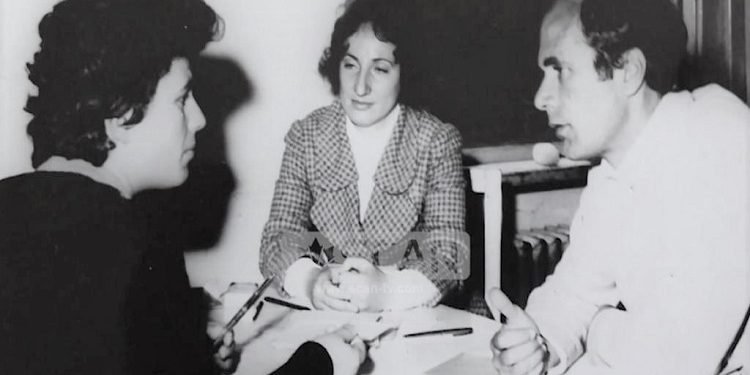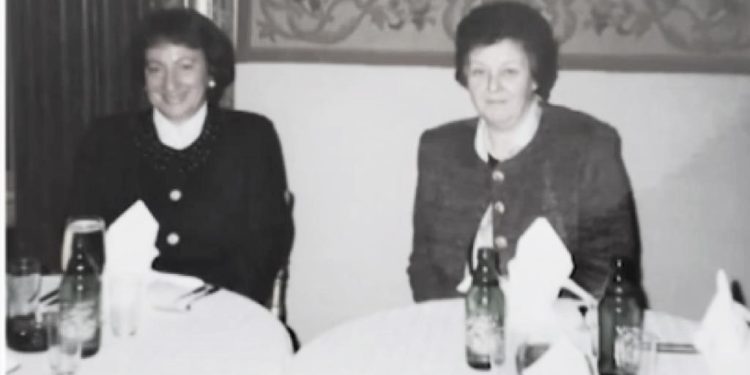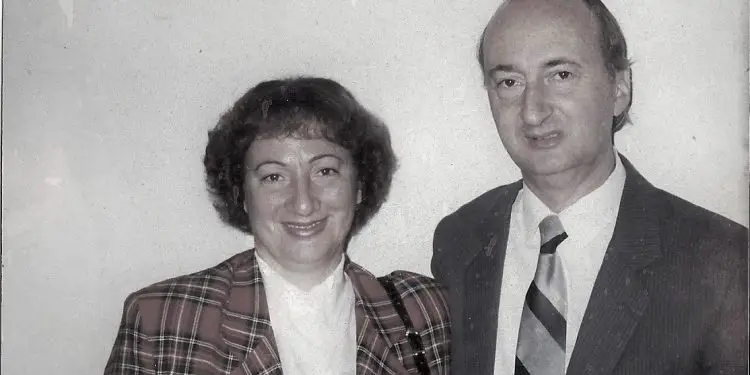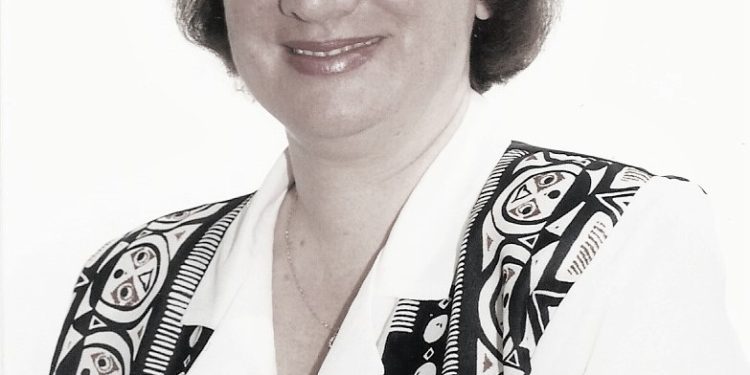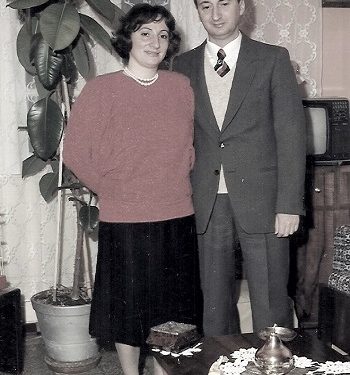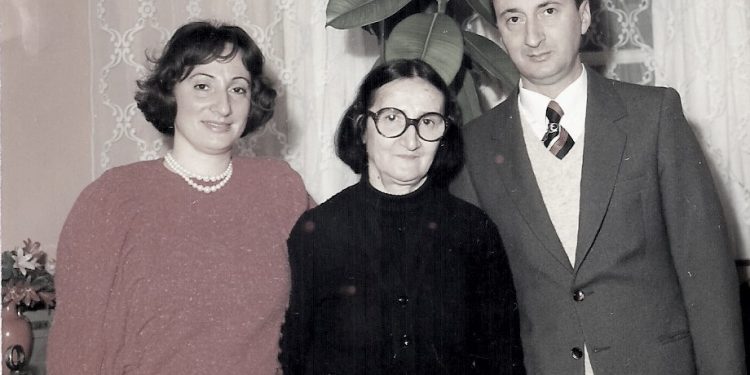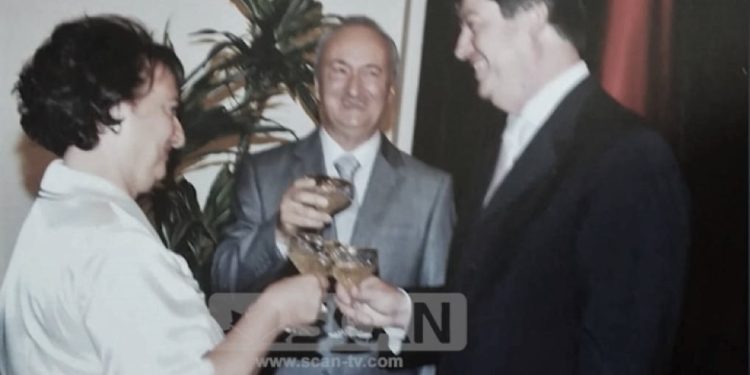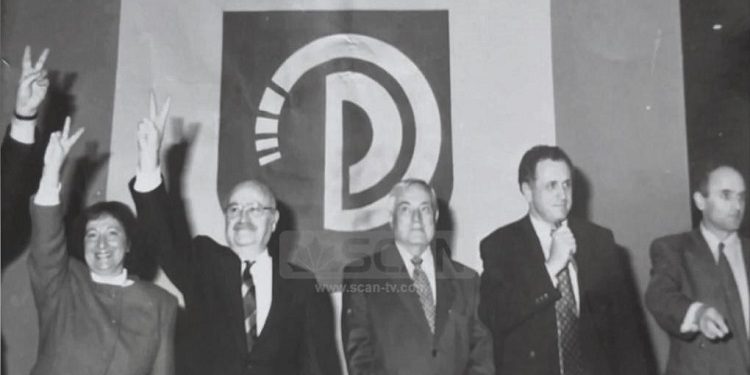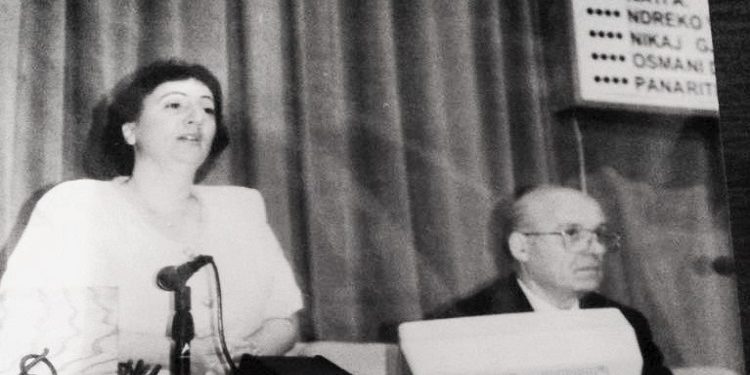By Dashnor Kaloçi
The third part
Memorie.al / Born and raised in a family with intellectual and aristocratic traditions, both from her father’s side (originating from Narta and Vlora), and from her mother (from the city of Durrës), even from four generations of graduated from the most popular universities in Europe, in various branches such as; Law, Economics and Medicine, even the older brother, (one of the icons of Albanian Medicine, for almost half a century), could not “deviate” from the family gene and the path that their forefathers had chosen and traveled, in the current of life. In fact, since she has gone a little further, since in addition to teaching as a lecturer, she has also engaged in active politics, being elected not only as a member of the Albanian Parliament, but also as the vice-president of the Parliament, although for a short time, as long as it lasted that legislature. Taking into account the branch where he graduated and the profession of university lecturer, which he practiced until he retired, and also his brother, who specialized in one of the best university clinics in Paris, at the beginning of the 70s not only has life not “petted” her, but it has also brought her a lot of vicissitudes in her journey and professional career. Due to the class struggle, the Party Committee of Region No. 1 of Tirana, labeled her as: “The daughter of a bourgeois lawyer, who studied in Switzerland before the liberation and she is not worthy to study…”, which deprived her of the branch she had chosen to follow. All these already belong to a past time, but due to our continuous requests, Prof. Dr. Margarita Qirko, are “forced” to break the “code of silence” that she has meticulously implemented until today, not remembering those past times, and speaking for the first time, for Memorie.al, in an interview, about the history of the family, and hers.
Continues from last issue
Ms. Margarita, what errors are you talking about?
The first mistake was the initial approval and not insisting on the later cancellation of Law 7501, which caused the property not to go to its owner. The property of people, who had suffered from the class war and had rotted in prisons and exiles, was taken by other people, or even those who called themselves democrats, without being so. This law overcame the letter “A”, of democracy, which is the return of property to its owner. Another mistake, again in this context, was giving different shops and bars to the sellers who had worked there. But this did not make sense, since those shops and shops were built on the land of people who had died in prisons and who had been forcibly taken from them, 46 years ago, and they had to be given the right of pre-emption.
I would say these decisions were very hasty, they created enmity between the affected parties and a slight ‘breeze’ of discontent started among the people. Another big mistake was allowing pyramid firms, even this thing was one of the biggest mistakes of the right-wing government of that time, because they then took on such frightening proportions that the opposing party (the left opposition), used it with the violent overthrow of the democratic government in 1997. The expression of the people, which says: “A good start, half the work”, has not remained in vain, but we did not start well.
During those years, did you continue to be involved in politics?
In this period we are talking about, i.e. in the years 1992-1996, I was quite active with the Democratic Party and was a member, apart from the National Council of the DP. Also in the Presidency of the PD of Tirana, always being a lecturer at the Polytechnic University. However, I had some interruptions, since in 1993-1994, at the Polytechnic University of Tirana, the “Tempus” project was approved, for the specialization of pedagogues, in other European Universities. So in 1993, we selected and assigned 10 lecturers, who would enrich our knowledge and experience, in cooperation with the relevant colleagues at the Polytechnic University of Athens.
The main leader of this project, at the Polytechnic University of Athens, was Nikolaos Uzunoglu. He was a professor in engineering subjects and a prominent capacity in this University. He committed all of us to work in the chairs of our respective subjects, to increase our level with their experience, making available all the materials for the new subjects, which our lecturers wanted to place in their chairs at the Polytechnic University of Tirana. Communication and cooperation with them continued over the years, in our scientific exchanges.
Was that the end of that specialization, or gaining experience?
It did not end there, as in 1994; I was again with my colleagues at the Polytechnic University of Athens, with the ‘Tempus’ project. I settled down to work in the chair of Numerical Analysis, where I referred my dissertation topic, which was received with interest by Greek colleagues. Cooperation with them was increased through work and they suggested and donated all the materials of the Matlab language to be placed in the Numerical Analysis subject, to raise the subject to a higher scientific level. Meanwhile, the year 1996 came, where the parliamentary elections were held in the month of May.
How do you remember those elections, what was your commitment there?
In that election, I was proposed by the branch of the Democratic Party of Tirana, as a candidate for DP deputy in electoral area no. 50th, an area which included the University Library and a part of “Kavaja Street”. The chairman of the PD branch in Tirana at that time was Albert Brojka, who stood by my side in every meeting with the voters, and I have high regard and deep gratitude for him.
Who was with you in that election campaign?
Mr. Sajmir Shehri, was the organizational leader of my campaign. I will never forget the kindness, the energy with which he worked, the persistence, the vision for a perfect organization, which defined him as a person. Thanks to a job with a lot of passion, love and dedication to the people I met, I managed to win as a deputy of the Parliament of Albania, on May 26, 1996, in area 50. I was happy that I would contribute to a much better life well, mostly my students. This mission justified my new path in politics. But the elections of May 26, 1996, had problems and hard times were looming on the horizon.
How do you remember your colleagues in the parliament of that time, after the elections of May 26, 1996?
My fellow MPs from the DP were knowledgeable people, some from the ranks of the University and others, prominent specialists in various fields. It was a well-formed parliamentary group that was aware of its mission. And all the ladies of this Parliament, where I participated, were a bouquet of kindness, love and tolerance.
You were elected vice president of that parliament, how do you remember who nominated you for that position?
The president, Prof. Dr. Sali Berisha called me to his office one day and informed me that I would be Vice-President of the Parliament, together with Pjetër Arbnor, as Speaker. I waited with reluctance, as I was not fond of looks and posts. The doctor ordered two coffees, wished me complete success in my new job, and that job, so to speak, became a fait accompli.
I found myself suddenly appointed Vice-President of the Albanian Parliament, excited and with the stress of the responsibility of the new task, to perform it with maximum dedication. At that moment, I had to finally part with the excellent relationships with my students and my passion in lecturing the subject, which gave me the maximum satisfaction of the profession.
How do you remember your first day as Deputy Speaker of the Parliament?
On 2 July 1996, the Parliament convened after the contested elections of 26 May. That day I was voted for and elected as the Vice-President of the Parliament. The Speaker, Mr. Pjetër Arbnori, gave a speech about the opening of the new Legislation and the problems that had occurred with the opposition. After his speech, I formulated a short presentation about the tasks that lay before us in this legislature.
I called Albanian democracy, a “fragile 4-year-old child”, which we must protect, strengthen, to make it “18 years old”, giving it the diploma of maturity, as with it comes light, comes kindness, comes knowledge and the happiness of Albanians. I also remembered the great national poet, Naim Frashër, who said: “For us Albanians, the sun rises there from the west.” So, I emphasized that the tasks ahead of us are difficult and the obstacles even greater, but we will succeed, uniting our minds, hearts and souls. The new task started well.
Did you have meetings with foreign politicians and dignitaries and how do you remember them?
We had many meetings, and among the first, I remember the one on October 29 of that year, when I went to Vienna, invited by the Vice-President of the Austrian Parliament, for a meeting that would take place with the countries of Southeast Europe. I was the only one in the Albanian delegation. The meeting was chaired by Anna Hasselbah, the Deputy Speaker of the Parliament, who delivered the opening speech. After her, since Albania had the letter a, (Albania), it was my turn to speak. The speech was followed with interest and welcomed by the hall, with warm applause, after my speech. At the dinner that Mrs. Hasselbah gave, she placed me next to her at the head table.
Have you hosted foreign politicians?
In that period, the Vice-President of the Canadian Parliament, Mr. David Kilgour, came to visit our country. He stayed two days and I had the opportunity to discuss with him, about the opening of a 12-year-old school, (Canadian-American), with all their teachers, with the exception of those of the Albanian language. I had a great desire to educate our students at a contemporary level, so that they could approach the gates of the civilized world as soon as possible.
The Vice-President of the Canadian Parliament, was from a background of writers and was excited by my request, being willing to help, for the establishment of this school, with the entire infrastructure, just like in his country. The school would also have dormitories, as well as other facilities, ranging from tennis courts, rugby fields, swimming pools, and an amphitheater. All the lecturers would be foreigners, as there were plenty of volunteer lecturers who wanted to help in the mission of education.
How did he respond to your request?
He told us that; I only need the land, because I have the other projects ready. We went together to the Prime Minister, Mr. Aleksandër Meksi, who took it upon himself to take an interest in determining the land where the school would be built. But that project was not meant to be realized, as everything was destroyed with the collapse of the pyramid firms and the mission of building the school was never completed.
David Kilgourin, I will never forget, because when the revolutions about pyramid schemes broke out, the country was thrown into chaos and life was uncertain, he sent me a message, saying that; if your life is in danger, I am ready to wait, along with your family. I was moved by his kindness and I remembered that expression: “Life is a journey, where its best stops are meetings with special people”.
What about other “stops” with personalities that left an impression on you, did you have at that time?
A special “stop” in my life was the meeting with the Israeli ambassador, based in Rome. The conversation was very friendly. My mission was the continuous specialization of our lecturers, in their Universities and the arrival of their lecturers, to help open various branches of information technology and other fields. He appreciated my proposal, after he told me that: “The future of a nation is closely related to the education that the youth receives”, referring to Albert Einstein.
When you quoted Einstein, who is your favorite scientist?
The most beloved scientist for me was and remains Albert Einstein, the genius of the Science of Physics. I carefully read his life and learned that this genius was affected. During his scientific research in the field of physics, when he studied electromagnetic fields, he was amazed by the harmony that existed between them.
He stopped at this point and asserted that there is a mystery here and that what he observed could not be accidental. In this way, the scientist who, with his theory of relativity, surprised the world and failed to understand it accepted the existence of the “mystery”. Based on this genius, I rightly ask the question:
We come into this life without being asked if we want to and at a time unknown to us.
We are placed in the body of a mother, whom we did not choose, and we become part of a family, without our own approval.
When we are born, we find ourselves in a state unknown to us. After this, the question naturally arises: Isn’t our coming into life part of the “mystery”, mentioned by the luminary and genius of Physics?
What is your answer to this?
In fact, we all have different lives and this is the result of the three factors above, they form straight lines, since they do not meet at any point. These factors are different for each person and create different initial speeds for achieving and realizing the life we want to have.
If we are born in an economically consolidated family and in a developed country, the initial speed is great, from childhood, to easily achieve the goals set for life. Life for me is the magical, realistic and very philosophical definition given by Isabel Allende: “Silence before birth, silence after death.” Life is a noise, between two merciless silences”.
How do you remember the local government elections held in October 1996?
I remember very well the local government elections in October 1996, where Mr. Albert Brojka, as a representative of the Democratic Party, won the post of Mayor of Tirana. The campaign was well organized and many foreign observers came from different countries of the world. Before the elections, I had many meetings with foreign guests, the most special of which was the one with a group of senators from Italy, accompanied by the Italian Ambassador to Albania, Mr. Paolo Foresti.
The conversation was quite pleasant and I, at one point, said explicitly: “Our youth did not enjoy their own youth, but from the TV screen, they lived the years of their youth, with the pleasure of the Italian youth. We heard your wonderful songs, which we sang every day, maybe better than you, through the Sanremo festival, Canzonissima, Teatro Diecit, UN disco per L’estate, etc. We know all your light music and opera singers. Albanians know Italian, as it is a foreign language, that through the glass screen, they satisfied their soul and enjoyed their unlived youth”.
During that conversation, we also talked about Italian literature, painting and sculpture. I spoke of Dante Alighieri, as a colossus in eternity; I mentioned the miracles of Michelangelo, David in Florence, and La Pieta in San Pietro, without forgetting Leonardo, with the world masterpiece; “Joconda”, located in the Louvre in Paris. Regarding this, I told them: “I am proud of the masterful translation into Albanian of ‘La Divina Komedia’ by our great master, Pashko Gjeçi”, who died in extremely difficult living conditions, in the cellars of “Shallvare”, after the 90s. The meeting was a spiritual delight, as you talked with people who amazed you with their knowledge.
What other details do you remember from that impressive meeting?
That meeting ended with that, but the next day, a messenger from the Italian ambassador, Paolo Foresti, came to my office, who presented me with the ambassador’s dedication, the book “La Divina Komedia” by Dante Alighieri, as a sign of thanks and gratitude to waiting for the day before. These are the best days of my life.
How do you remember the departure from power of the Democratic Party at that time and how did you personally experience it?
After the local elections of October 1996, the situation with the pyramid firms worsened, until Sudja went bankrupt in December. The people protested about the lost money and slowly the situation began to worsen, which then led to total anarchy that covered the whole country. In Vlora, the protest was very fierce and the armed uprising there was accompanied by macabre actions, which were unacceptable in the 20th century.
These moments were the most difficult days I have experienced in my entire life. In March 1997, the new government of National Reconciliation was installed, with Prime Minister Bashkim Finon. Everything was moving towards new elections and the Parliament closed its work in May 1997, while the elections were to be held on June 29, i.e. a month later.
How do you remember the parliamentary elections in that difficult time the country was going through?
I was appointed by the presidency of the Democratic Party, as a candidate for deputy in constituency no. 47 in Tirana. The area was at the “Chimney” above the “Mother Teresa” hospital, an area which was very difficult, since at that time it was controlled by Nehat Kulla, who was a supporter of the left of that time and the coalition that the Socialist Party made with several parties of other small ones.
Who were you facing in that area, from the left?
As a candidate from the Socialist Party, I had Luan Hajdaraga and Arben Imam from the Democratic Alliance. The war was very fierce, as the area was on the left. The campaign was carried out violently by the opposing side, with the disruption of meetings, threats to the voters, until the murder without any reason, of Ylli Sula, a very good man, former persecuted politician, who had suffered for years in prisons of the communist dictatorship.
He was an active supporter of the Democratic Party, who was working his land when he was killed. The members of my staff of the Democratic Party, who were assigned to the campaign, such as Sanije Caco, who have helped me a lot, organizing a dignified campaign, despite the difficult conditions of the state in which the country of Tirana was in that time.
You didn’t win in that election?
I lost with Luan Hajdaraga, by a small margin, as many factors influenced this unusual time, where, as I pointed out a little above, terror reigned. Tirana came out 15 to 0. No DP MP won. The sadness was very great, due to the events that had happened, that terrible year for Albania. Memorie.al
The next issue follows




